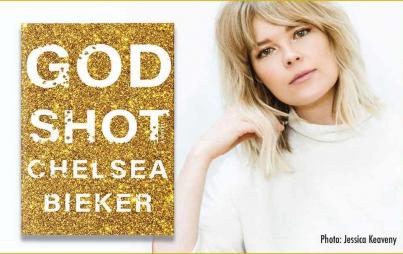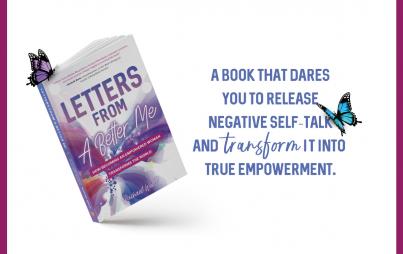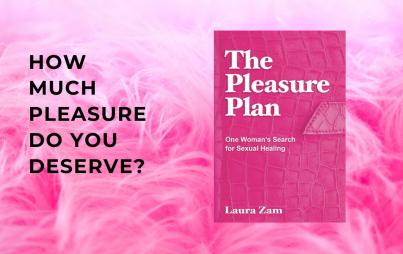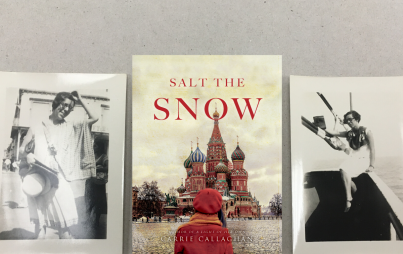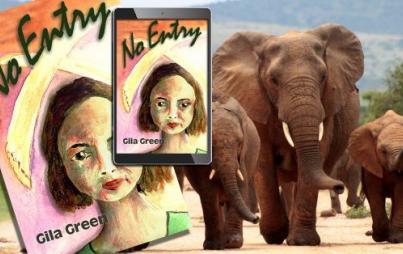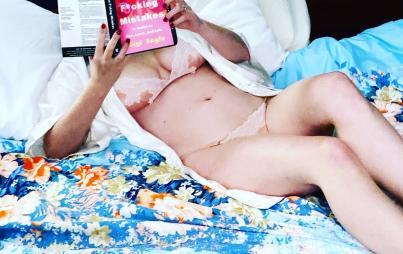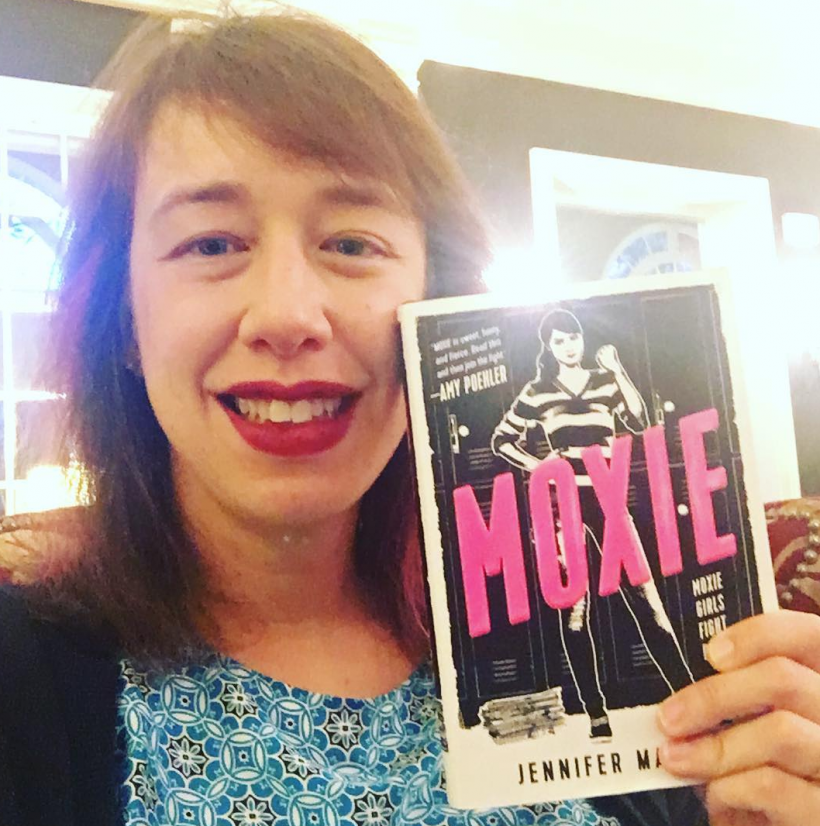
Jennifer Mathieu has spent much of her adult life pouring into the lives of teenagers, both through her day job as a high school English teacher and through the four books for young readers she has written.
The fourth, MOXIE, released Sept. 12 from MacMillan Roaring Book Press; it’s gotten some buzz based on its premise as a feminist novel about a young girl who starts distributing feminist zines in her Texas high school, inciting something of a revolution reminiscent of the Riot Grrrls in the 1990s. The film rights have already been picked up by Paper Kite, Amy Poehler’s production company.
Mathieu began her career as a journalist, working for an alternative weekly called The Houston Press, where she did long-form journalism for years. She moved away from the journalism field because, she said, she “didn’t have the taste for blood” necessary. “I loved writing stories when people wanted to talk to me,” she admitted, “but I was not good at writing stories where I had to like…search people out or harass people or something.”
That’s why she moved on to be a teacher, but she didn’t give up writing altogether. She moved on to writing Young Adult novels, in part because she began reading the genre in order to know what her students were reading.
I was so excited to have the opportunity to chat with Jennifer over the phone recently. We talked for more than 30 minutes, me in Central Park while she hung out in her parents’ backyard in D.C., and covered a lot of ground, from her feminism to her writing to the book and some drama a negative Kirkus review created around it earlier this year. She has amazing things to say!
Getting into writing was a natural…you were always writing…but why do you continue writing, even with a full-time job and a child and a husband, why is it something you still commit to?
I don’t know that I have a very good answer for you, other than when I’m not writing, I feel like I’m not fulfilling…
I sound like an alien from another planet…but I feel like I’m here for a reason. We’re all here for different reasons, different purposes, multiple purposes, so maybe with your writing one of your reasons that you’re here is to open people’s awareness of mental health issues, so for me, my writing…it’s a huge part of my identity, and I still love to do it, even though it’s hard and doesn’t come easily.
My first two young adult books never sold, they were good enough to get me an agent, and I slaved over them and I worked so hard on them and my agent and I worked so hard on them, and they never sold, and it was so demoralizing to get rejection after rejection after rejection.
And I remember at one point sitting on the couch with my husband and I was so dejected, and I was like, “I just don’t know if this is ever gonna happen for me,” and he was like, “Well, do you still love to write? At your core, forget the publishing side of things, do you still love the craft?” And I was like “yes, if I didn’t do it I would feel like I was missing some huge part of my identity.” And then he was like “well then you’ve gotta keep doing it,” you know, and so I did, and eventually I sold my next book.
The best answer is that I can’t conceive of my life not doing it in some capacity.
I’m so glad your husband was there to encourage you to keep doing it!
Yeah, he’s like my #1 cheerleader.
So [another] general writing question: what would you say is the most rewarding thing about writing?
I think when people tell me that my fiction has validated them in some way.
My second novel, DEVOTED, was probably my quietest book, it certainly sold the fewest number of copies out of all my books. It was about a young woman that was growing up in a very restrictive religious environment almost like a cult and it was kind of based off…the Duggar family…I have a million things I could say about them…but I did all this research on them and I did all this but I wanted to tell a compassionate, empathetic story about a young woman who was being raised in a family like that, and found a way out, like it wasn’t working for her.
So I did a lot of research and I actually interviewed a lot of women that had been raised in these kind of families, so Christian patriarchy families, and I wrote this book…a lot of them were really nervous to talk to me, cause I think they thought I was gonna be making fun of them, or their families, and so I worked really hard on this book.
Even though that book has sold the fewest number of copies, it has had the best and most rewarding reader feedback, in that I have had young women and girls from as far away as Germany contact me and tell me that they had never seen their lives represented in fiction before, and that to read about a girl who had lived through what they had lived through was so validating and so empowering for them.
And so I think that as a writer that has been my biggest reward is just feeling like through my fiction and providing some sort of validation and empathy for my readers.
Is there anything you would consider the most difficult part of writing?
This is just a straight-up craft question: I really struggle with plot, in terms of fiction. I come up with characters and setting and mood and metaphors, but I really struggle with pacing and plot because my characters are always so fascinating to me, I’ll just write this whole chapter of them brushing their teeth and that’s interesting to me, but my editor is like, “um, what is happening in this chapter, we need something to advance the plot…”
I mean, those are the kind of chapters you save and then hardcore fans will just eat that up…
For me the hardest part of writing is plotting in terms of writing fiction. I know writers that have five or six plots in their mind…I’m like…how do you do it?
Why did you write [MOXIE], if you had to boil it down?
Well, I’m a feminist, and I think living my life as a feminist has made my life more joyful and more fulfilled, and I am a whole-hearted supporter of getting as many young women on board with the women’s movement as possible. I’m very open about the fact that I would love it if MOXIE would serve as a gateway drug to feminism. I’m very unabashedly candid about that. I think the feminist movement has done a lot for women and girls, including myself, and I just wanna let girls know about it in a way that, I think, with young adult fiction can be a nice entry point.
In the book, I try to tackle a lot of things that teenage girls specifically may feel about what they think feminism may be — like, can you be a feminist and still like boys, can you be a feminist and still wear lipstick? Of course, the answers to those questions are yes. So I think I’m also trying to dispel some of the myths that teenage girls may have about feminism because of the way that it’s talked about in the culture. That’s another goal of mine.
Those are myths I grew up with.
It’s so fun as a high school teacher, because — I talk about my feminism and I’m very honest about it — and I always love blowing the minds of some of these young male students I have, because I talk about how much I love my husband and they see that I’m wearing lipstick, and they’re like, “but wait, how is this working?” And I’m like, “well, see, you can do both!” And the great thing about being married is that my husband is like a full partner in our marriage and doesn’t consider taking care of his own child to be babysitting.
Now, I would be remiss as a journalist if I didn’t bring up the Kirkus review…that’s the reason I found the book. Anything you wanted to say about that?
I think that, as an author, my work is open to criticism from anybody that wants to give it, you know that you can’t write books and not expect people to have a varied kind of reaction to that work. At the same time, I think the biggest takeaway for me was I felt very supported and I felt very heartened by the response from the community, both the YA community and the feminist community, and how they responded and I just felt really supported that day and beyond. So I think that I was really happy and validated by that support.
One of the review’s critiques was that [MOXIE] didn’t teach a lesson, and I know there’s been a lot of discussion about whether books, that’s their purpose, what do you think? Should books, especially for young adults…have an inordinate pressure?
I think that Kirkus is not the only time that I’ve heard that critique that books for young people should teach lessons or model certain behavior, I’ve heard that many times, and what I always say is that teenagers are not stupid…. Teenagers can see when people are trying to lecture them…
Is there anything else you’d like to say about MOXIE?
In MOXIE, the main character is white, and Riot Grrrl was a primarily white movement — not that there weren’t Riot Grrrls of color, there were, but it was a primarily white movement which is one of the criticisms that I think was fairly applied to that movement.
So when I wrote this book, you know, I’m not…I have no patience for white feminism, I have no purpose for it, if my feminism is not intersectional it’s not anything. So I really tried to make a concerted effort to include voices…while I fully own that my protagonist is white and that Riot Grrrl was a white movement… Texas is not a white place.
There’s not a lot of white places in America, we’re a diverse country, and I tried really hard to create a book that has a lot of different voices in it, and I think that Vivian as a white character especially learns and grows, and sees that, as a white woman she is afforded certain privileges that women of color are not afforded, and so I tried really hard to address that in the book and critique Riot Grrrl — with love, because I have a lot of fond memories and love for Riot Grrrl, but I think that’s also something that can be talked about without denigrating Riot Grrrl, but something we can learn from and so that’s one thing I’m really excited about.
Like I said, I’m 40 years old, and when I see women and girls talking about feminism today, and I’ve been a sponsor of the feminist club at my high school where I teach, I see these young people that are so much more aware of the need to be intersectional and diverse, that all marginalized groups are linked, we all gotta fight together, so that’s something I tried to do for MOXIE, and I also hired a former student of mine who is running the MOXIE Tumblr, www.moxiegirlsfightback.com, where we kind of try to explore a little bit more of that and readers can submit artwork and find resources there, and reading lists…
I’m hopeful that the book won’t just be the book, that there will be other things that readers can connect with, once they finish reading the book.



